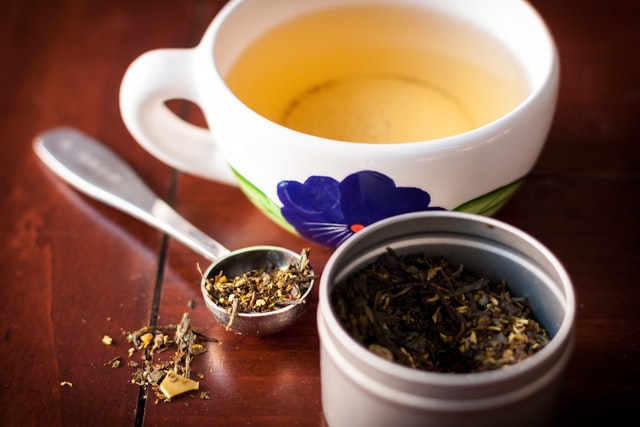Tea is one of the most popular beverages consumed worldwide. Tea from the plant Camellia sinensis is consumed in different parts of the world as green, black, or Oolong tea. But, these days the most significant effects on human health have been observed with the consumption of green tea. The first green tea was exported from India to Japan during the 17th century. It is estimated that about 2.5 million tons of tea leaves are produced each year throughout the world which is mainly consumed in Asia, some parts of North Africa the United States and Europe.
Green tea and black tea are processed differently during manufacturing. To produce green tea, freshly harvested leaves are immediately steamed to prevent fermentation, yielding a dry, stable product. This steaming process destroys the enzymes responsible for breaking down the color pigments in the leaves and allows the tea to maintain its green color during the subsequent rolling and drying processes.

Green Tea composition
The chemical composition of green tea is complex: protein (15-20% dry weight), amino acids (1-4% dry weight), carbohydrates (5-7% dry weight), the proportion of polyphenols (45-90%), and caffeine content (0.4-10%). Green tea contains polyphenols, which include flavanols, flavonoids, and phenolic acid. Most of the green tea polyphenols (GTPs) are flavonols, commonly known as catechins. Catechins is a chemical compound in studies using animal models that show that green tea catechins provide some protection against degenerative disease.
Green Tea Health Benefits
People used green tea in traditional Chinese and Indian medicine to control bleeding and heal wounds, aid digestion, improve heart and mental health and regulate body temperature. Green tea is touted to be one of the healthiest beverages. It is loaded with antioxidants that have many health benefits which may include such as improved brain function, fat loss, protection against cancer, and lowering the risk of heart disease.
The things Green Tea May Do for Your Body
- Drinking green tea may have a protective effect on the heart.
- Green Tea may help protect against certain types of cancer.
- Your Alertness and Brain Health may improve by drinking green tea.
- Green Tea could help lower Blood Sugar Levels in people with Type-II Diabetes.
- Green Tea may help repair damaged skin and protect against skin cancer.
- Green Tea may help reduce Rheumatoid Arthritis symptoms.
- Green Tea can be part of a Health Weight Loss Diet.
- Green Tea is pack of nutritional punch.
Green tea is rich in polyphenols, which are natural compounds that have health benefits, such as reducing inflammation and helping to fight cancer. Green tea is loaded with polyphenol antioxidants, including a catechin called EGCG. These antioxidants can have various beneficial effects on health.
Improve brain function, it may also help boost brain function. Research has consistently shown that caffeine can improve various aspects of brain function, including mood, vigilance reaction time, and memory. It also contains the amino acid L-theanine, which can cross the blood-brain barrier. Green tea contains less caffeine than coffee but enough to produce an effect.
These days people suffer from obesity and lose weight is everyone goal these days. In the market, there are many types of products to lose weight at expensive cost and some are not effective as they said but people want to try each and every product because their goal is to lose weight so if you know green tea helps you to lose your weight. This is because, according to research, green tea can increase fat burning and boost metabolic rate. Green tea is an excellent source of powerful antioxidants.
Research has linked green tea compounds with a reduced risk of cancer instance first one is breast cancer a comprehensive review of observational studies found that women who drank the greenest tea have an approx 20-30% lower risk of developing breast cancer, one of the most common cancers in women. Prostate cancer one study observed that men drinking green tea had a lower risk of advanced prostate cancer. Colorectal cancer studies showed that those drinking green tea were around 42% less likely to develop colorectal cancer. Multiple studies show that green tea drinkers have a lower risk of various types of cancer. It may protect the brain from aging. The bioactive compounds in green tea can have various protective effects on the brain. They may reduce the risk of dementia, a common neurodegenerative disorder in older adults.

It may reduce bad breath. Streptococcus mutant is a common bacterium in the mouth. It causes plaque formation and is a leading contributor to cavities and tooth decay. It also may help prevent type2 diabetes. Studies show that green tea may improve insulin sensitivity and reduce blood sugar levels. Cardiovascular diseases, including heart disease and stroke, are the leading causes of death worldwide. Green tea may lower total and LDL (bad) cholesterol, as well as protect the LDL particles from oxidation. Studies show that people who drink green tea have a lower risk of cardiovascular disease. Studies show that people who drink green tea may live longer than those who don’t.
Often questions we can discuss just like what happens if I drink green tea every day so if you consume green tea daily can help you lose weight and reduce your risk of several diseases, including diabetes, heart disease, and cancer. Our second question is what is the best time to drink green tea? Studies show that the best time to drink green tea is in the morning and before a workout and yeah swapping your cup of coffee/tea with green tea is the best way to start your day. Our last question is who should not drink green tea? People with sleep disorders and insomnia should avoid green tea consumption close to bedtime. Green tea is good for you, but only if drunk in moderation. So, do not have more than two to three cups a day, and make sure never to have a green tea on an empty stomach.
So, there are the benefits of green tea so take it in moderation and enjoy your favorite drink.
Contributed By - Sonam Goswami


